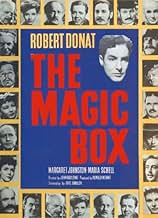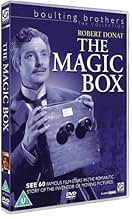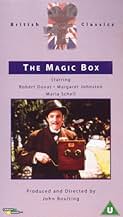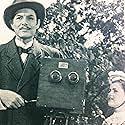CALIFICACIÓN DE IMDb
7.0/10
1.5 k
TU CALIFICACIÓN
Agrega una trama en tu idiomaA chronicle of the life of William Friese-Greene, a British inventor and early pioneer in cinema.A chronicle of the life of William Friese-Greene, a British inventor and early pioneer in cinema.A chronicle of the life of William Friese-Greene, a British inventor and early pioneer in cinema.
- Nominada a2premios BAFTA
- 1 premio ganado y 2 nominaciones en total
Renée Asherson
- Miss Tagg
- (as Renee Asherson)
- Dirección
- Guionistas
- Todo el elenco y el equipo
- Producción, taquilla y más en IMDbPro
Opiniones destacadas
This biopic of inventor William Friese-Greene was based on Ray Allister's book "Friese-Greene: Close-up of an Inventor". Allister used the recollections of the inventor's family and friends for his biography. Such sources have oft proved unreliable, and this is such a case. Brian Coe and other historians have since debunked some of the myths invented by Friese-Greene and perpetuated by his family, friends and biographers. The mythical result here, in this film, is that Friese-Greene appears as the primary inventor of motion pictures and cinema.
The climax of "The Magic Box" has Friese-Greene projecting his film taken at Hyde Park to a policeman. The film-within-the-film is not the actual photographs taken by Friese-Greene, but the invention of the makers of "The Magic Box". This first film appears in a condition that would rival the Lumière programs of some six years later; the flickers and jitters are unrealistically light. Moreover, it would be the first multi-shot film, preceding by about eight years the earliest such films that I've seen or read of. The first part, which takes place in the park, with a man and his son approaching the camera, is followed by the so-called scene of leisurely pedestrians, open-topped buses and hansom cabs with trotting horses. In this last part, however, which doesn't exist today, appears within "The Magic Box" as a scene of curious observers looking at the likewise observing camera.
Allister, however, has reprinted six frames of the first part of the subjects. Others have surmised that this film was taken at about four or five frames per second. The film within "The Magic Box", however appears to have been photographed at least at 16 frames per second, which is generally acknowledged as the minimum speed for the illusion of motion. Moreover, the Hyde Park film probably wasn't seamlessly projected; the film wasn't even perforated. Two frames each were also photographed at a time, which explains why, as you can see in "The Magic Box", Friese-Greene's camera features two lenses. This was because the film was a stereoscopy attempt; that is, Friese-Greene thought he might be able to produce three-dimensional images by overlapping two simultaneously photographed frames. Allister has also reprinted four frames from another film by Friese-Greene--a street scene taken in Chelsea. This film is perforated, but still appears to have been photographed at probably no more than five frames per second.
On a further historical note, Friese-Greene is said to have given some public demonstrations of films, although he doesn't seem to have been too successful with them. Later, he gave public showings of Birt Acres's films, which seems an indication of his own incomplete work on motion pictures. Additionally, Greene's former business partner Arthur Collings did go on to become one of Britain's earliest filmmakers; he was giving public performances of his films in late 1896.
In short, the movie industry demonstrated itself incapable of rendering even its own history accurately. This isn't necessarily a knock on the quality of "The Magic Box", though. I've come not to expect accurate history lessons from movies (and, sometimes, not even from books). Interestingly, and probably more accurately, Friese-Greene's life is depicted throughout the rest of the film as an indebted and failed inventor, who lost his family and, it would seem, part of his sanity. The flashback storytelling structure is accessible. The fictionalized, climactic moment of success, as a dramatic, self-reflexive scene is quite moving. The film, in general, is absorbing, and the production values are topnotch. Friese-Greene's camera, other pre-cinema trinkets and the originally slow process of taking photographs are well rendered. I also liked the fairground scene where they catch a glimpse of three Lumière films projected within a tent. Its history is inaccurate, but "The Magic Box" is nevertheless an inspired look back at the beginnings of the art form.
The climax of "The Magic Box" has Friese-Greene projecting his film taken at Hyde Park to a policeman. The film-within-the-film is not the actual photographs taken by Friese-Greene, but the invention of the makers of "The Magic Box". This first film appears in a condition that would rival the Lumière programs of some six years later; the flickers and jitters are unrealistically light. Moreover, it would be the first multi-shot film, preceding by about eight years the earliest such films that I've seen or read of. The first part, which takes place in the park, with a man and his son approaching the camera, is followed by the so-called scene of leisurely pedestrians, open-topped buses and hansom cabs with trotting horses. In this last part, however, which doesn't exist today, appears within "The Magic Box" as a scene of curious observers looking at the likewise observing camera.
Allister, however, has reprinted six frames of the first part of the subjects. Others have surmised that this film was taken at about four or five frames per second. The film within "The Magic Box", however appears to have been photographed at least at 16 frames per second, which is generally acknowledged as the minimum speed for the illusion of motion. Moreover, the Hyde Park film probably wasn't seamlessly projected; the film wasn't even perforated. Two frames each were also photographed at a time, which explains why, as you can see in "The Magic Box", Friese-Greene's camera features two lenses. This was because the film was a stereoscopy attempt; that is, Friese-Greene thought he might be able to produce three-dimensional images by overlapping two simultaneously photographed frames. Allister has also reprinted four frames from another film by Friese-Greene--a street scene taken in Chelsea. This film is perforated, but still appears to have been photographed at probably no more than five frames per second.
On a further historical note, Friese-Greene is said to have given some public demonstrations of films, although he doesn't seem to have been too successful with them. Later, he gave public showings of Birt Acres's films, which seems an indication of his own incomplete work on motion pictures. Additionally, Greene's former business partner Arthur Collings did go on to become one of Britain's earliest filmmakers; he was giving public performances of his films in late 1896.
In short, the movie industry demonstrated itself incapable of rendering even its own history accurately. This isn't necessarily a knock on the quality of "The Magic Box", though. I've come not to expect accurate history lessons from movies (and, sometimes, not even from books). Interestingly, and probably more accurately, Friese-Greene's life is depicted throughout the rest of the film as an indebted and failed inventor, who lost his family and, it would seem, part of his sanity. The flashback storytelling structure is accessible. The fictionalized, climactic moment of success, as a dramatic, self-reflexive scene is quite moving. The film, in general, is absorbing, and the production values are topnotch. Friese-Greene's camera, other pre-cinema trinkets and the originally slow process of taking photographs are well rendered. I also liked the fairground scene where they catch a glimpse of three Lumière films projected within a tent. Its history is inaccurate, but "The Magic Box" is nevertheless an inspired look back at the beginnings of the art form.
A stunning biography of William Friese-Greene, the UK inventor who made important contributions towards the creation of the motion picture, then saw greatness pass him by. Brilliantly written by Eric Ambler, and with beautiful color photog by Jack Cardiff (working in the 3-strip Technicolor process that we see Friese-Greene working towards in the picture!). Robert Donat's performance in the lead is among his best screen work. As this was made on the occasion of Britain's 1951 "Festival of Lights", virtually every British actor of note at the time appears in the picture---but pay particularl attention for Laurence Olivier, as a London "bobby" who is the first to see Friese-Greene's "pictures that move", and for the film's closing line, delivered by Dennis Price.
Much has been said in other reviews about the subject of John Boulting's biopic, the inventor William Friese-Greene, who spent his life trying to create the eponymous "magic box" that would show moving pictures. Whether he was the first to do so is largely insignificant: the fact that he went largely unrecognized assumes far greater importance.
Planned to celebrate the Festival of Britain in 1951, THE MAGIC BOX recognizes the achievements of someone who spent just about everything - time, money and effort - on his work. Director Boulting alternates between scenes in Friese Greene's (Robert Donat's) laboratory, with domestic sequences involving his wives Edith (Margaret Johnston) and Helena (Maria Schell). Although a devoted husband, Friese-Greene is so obsessed with his work that he neglects his family; as shown in several sequences where he begins to talk excitedly about his discoveries, while remaining oblivious to his wives' complaints. In one sequence, for example, Edith has to remind him that he has missed an important concert at which he was supposed to be the soloist; to avoid any embarrassment with the conductor (Muir Matheson), she had to fill in for him. Sometimes his wives sacrifice their own health to support him; Helena is shown in close-up crumpling a medicinal prescription in her hand as she travels home by coach. In her view it's far more important to encourage Friese-Greene's work than to cure her congenital heart condition.
Boulting adopts an equivocal view of Friese-Greene's work; although obviously an innovator, his obsessions caused pain and suffering in his family, and led to the break-up of profitable partnerships such as that with rich northern business person Arthur Collings (Eric Portman), which could have secured Friese-Greene's financial future.
The film is structured in double flashback, showing us how Friese- Greene's life, and enabling Donat to give a virtuoso performance in the title role. This most underrated of British actors was particularly good at portraying tortured souls (remember GOODBYE MR. CHIPS (1939)), and he manages to communicate the pain lurking at the heart of Friese-Greene's soul, once he realizes the damage he has done to his family. Boulting is fond of using the quick close-up to register his emotions.
As well as being a celebration of the inventor, THE MAGIC BOX celebrates the British film industry by offering roles to virtually all the major stars (and supporting actors) working in the studios at that time. The film offers fans the pleasure of identifying people in the smallest roles, and enjoying scene-stealing cameos such as Margaret Ruthferford's irascible dowager telling Friese- Greene's first employer Guttenberg (Frederick Valk) off; Joyce Grenfell at her toothiest as a member of Edith's choral society; Sidney James and William Hartnell as a pair of World War One army personnel; and Laurence Olivier in his famous cameo as a London police officer marveling at Friese-Greene's invention.
Thematically speaking, Eric Ambler's script might be a familiar one, but that does not prevent viewers from enjoying the film as a celebration of a long-forgotten figure as well as British films as a whole.
Planned to celebrate the Festival of Britain in 1951, THE MAGIC BOX recognizes the achievements of someone who spent just about everything - time, money and effort - on his work. Director Boulting alternates between scenes in Friese Greene's (Robert Donat's) laboratory, with domestic sequences involving his wives Edith (Margaret Johnston) and Helena (Maria Schell). Although a devoted husband, Friese-Greene is so obsessed with his work that he neglects his family; as shown in several sequences where he begins to talk excitedly about his discoveries, while remaining oblivious to his wives' complaints. In one sequence, for example, Edith has to remind him that he has missed an important concert at which he was supposed to be the soloist; to avoid any embarrassment with the conductor (Muir Matheson), she had to fill in for him. Sometimes his wives sacrifice their own health to support him; Helena is shown in close-up crumpling a medicinal prescription in her hand as she travels home by coach. In her view it's far more important to encourage Friese-Greene's work than to cure her congenital heart condition.
Boulting adopts an equivocal view of Friese-Greene's work; although obviously an innovator, his obsessions caused pain and suffering in his family, and led to the break-up of profitable partnerships such as that with rich northern business person Arthur Collings (Eric Portman), which could have secured Friese-Greene's financial future.
The film is structured in double flashback, showing us how Friese- Greene's life, and enabling Donat to give a virtuoso performance in the title role. This most underrated of British actors was particularly good at portraying tortured souls (remember GOODBYE MR. CHIPS (1939)), and he manages to communicate the pain lurking at the heart of Friese-Greene's soul, once he realizes the damage he has done to his family. Boulting is fond of using the quick close-up to register his emotions.
As well as being a celebration of the inventor, THE MAGIC BOX celebrates the British film industry by offering roles to virtually all the major stars (and supporting actors) working in the studios at that time. The film offers fans the pleasure of identifying people in the smallest roles, and enjoying scene-stealing cameos such as Margaret Ruthferford's irascible dowager telling Friese- Greene's first employer Guttenberg (Frederick Valk) off; Joyce Grenfell at her toothiest as a member of Edith's choral society; Sidney James and William Hartnell as a pair of World War One army personnel; and Laurence Olivier in his famous cameo as a London police officer marveling at Friese-Greene's invention.
Thematically speaking, Eric Ambler's script might be a familiar one, but that does not prevent viewers from enjoying the film as a celebration of a long-forgotten figure as well as British films as a whole.
Probably one of the finest films about film to be produced. Made for the Festival of Britain in 1951, the cast boasts just about every major British star of the time. The plot involves a somewhat fictionalized history of English motion picture pioneer William Friese-Green. It is technically excellent, period details are superb and the script intelligent and poignant. Donat, as Friese-Green, is superb. The sequence where he shows an awestruck local Bobby (Laurence Olivier) the first projected motion picture image is stunning. For lovers of early film....indeed all film....this movie is a must.
I'm sure it didn't hurt in the resolve of the British film industry to honor one of its pioneers and one who some claim to have been the actual inventor of motion pictures, William Friese-Greene, to have one of his grandchildren, Richard Greene as a film star in his own right. The Magic Box is a fine tribute to someone generally forgotten if known at all to American audiences especially.
Robert Donat brings his Mr. Chips character and weaves it into the character of William Friese-Greene. The story is told in flashback and in reverse order, first by his second wife Margaret Johnston from their first meeting in 1897 through their marriages and then later by Donat himself as he remembers his first wife Maria Schell. But in both remembrances, the thing that stands out is his driving obsession to capture movement on some medium. As Donat eloquently puts it, 'movement is life'.
It costs him dear, he does not get the credit he feels due him, it goes to that upstart Thomas Edison from the USA. Actually fellow Britishers George Alfred Smith and Charles Urban and Frenchmen Auguste and Louis Lumiere and Emile Reynaud all could claim pioneering contributions to the motion picture as well. Friese-Greene was a fine portrait photographer, but spent all his money on his experiments, even selling the patent he took out on his early motion picture camera.
Donat, Johnston and Schell are supported by a massive cast of the best British players doing small parts in tribute and belated recognition to the guy who now is considered if not THE inventor of motion pictures, the founder of British cinema. From Laurence Olivier in the role of an astonished policeman who is the first to see Robert Donat's breakthrough, to Bernard Miles as Donat's stuffy cousin who's worried about having the bite put on him, to young John Howard Davies as the youngest of Friese-Greene's sons, you'll recognize lots of familiar faces.
Still the film belongs to Donat as the obsessed, but touching Friese- Greene who helped give the world a universal medium of entertainment. Donat never gave a bad performance on the screen and Friese-Greene ranks among his best.
Robert Donat brings his Mr. Chips character and weaves it into the character of William Friese-Greene. The story is told in flashback and in reverse order, first by his second wife Margaret Johnston from their first meeting in 1897 through their marriages and then later by Donat himself as he remembers his first wife Maria Schell. But in both remembrances, the thing that stands out is his driving obsession to capture movement on some medium. As Donat eloquently puts it, 'movement is life'.
It costs him dear, he does not get the credit he feels due him, it goes to that upstart Thomas Edison from the USA. Actually fellow Britishers George Alfred Smith and Charles Urban and Frenchmen Auguste and Louis Lumiere and Emile Reynaud all could claim pioneering contributions to the motion picture as well. Friese-Greene was a fine portrait photographer, but spent all his money on his experiments, even selling the patent he took out on his early motion picture camera.
Donat, Johnston and Schell are supported by a massive cast of the best British players doing small parts in tribute and belated recognition to the guy who now is considered if not THE inventor of motion pictures, the founder of British cinema. From Laurence Olivier in the role of an astonished policeman who is the first to see Robert Donat's breakthrough, to Bernard Miles as Donat's stuffy cousin who's worried about having the bite put on him, to young John Howard Davies as the youngest of Friese-Greene's sons, you'll recognize lots of familiar faces.
Still the film belongs to Donat as the obsessed, but touching Friese- Greene who helped give the world a universal medium of entertainment. Donat never gave a bad performance on the screen and Friese-Greene ranks among his best.
¿Sabías que…?
- TriviaOne of the extras in this movie is a teenage Ronald Kray (later the infamous London gangster).
- ErroresIn 1915 when Green's three eldest sons join the army, the landlord's agent mentions that the Spanish influenza is going around. In actuality the Spanish influenza did not begin until 1918.
- Citas
William Fox-Talbot: The original thinker - the innovator - mustn't mind seeming a little foolish to his contemporaries. He must always look to his star... In the end, he may still fail. That's unimportant. If he is true to himself, he won't be too unhappy or embittered, even in failure, and will still speak for what is good.
- Créditos curiososClosing credits superimposed over the tablet bearing the following: WILLIAM FRIESE-GREENE 1855 - 1921 A PIONEER OF THE CINEMA
- ConexionesEdited into Kraft Television Theatre: The Magic Box (1956)
Selecciones populares
Inicia sesión para calificar y agrega a la lista de videos para obtener recomendaciones personalizadas
- How long is The Magic Box?Con tecnología de Alexa
Detalles
- Fecha de lanzamiento
- País de origen
- Idioma
- También se conoce como
- Der wunderbare Flimmerkasten
- Locaciones de filmación
- Productora
- Ver más créditos de la compañía en IMDbPro
- Tiempo de ejecución1 hora 58 minutos
- Relación de aspecto
- 1.37 : 1
Contribuir a esta página
Sugiere una edición o agrega el contenido que falta

Principales brechas de datos
By what name was The Magic Box (1951) officially released in Canada in English?
Responda

































